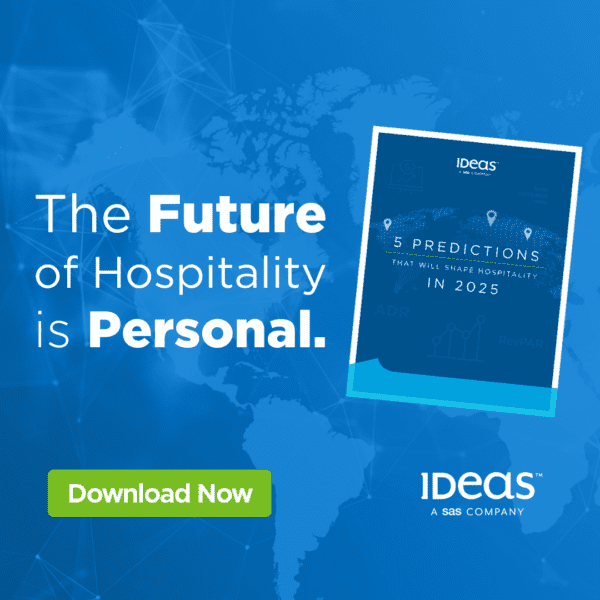 Hospitality businesses must find ways to differentiate themselves to remain competitive against ever growing industry disruption.
Hospitality businesses must find ways to differentiate themselves to remain competitive against ever growing industry disruption.
According to the 22nd Annual Global CEO Survey by PwC, the hospitality and leisure industry’s success continues to rest on its ability to cater to individual consumers’ preferences and desires. As the 3,200 global CEOs interviewed for the survey put it: “People eat, sleep, play games, cement friendships and seek cures in hospitality facilities.” However, recent trends suggest that the industry has been losing that connection with their customers as third-party sites such as Booking.com, Hotels.com or TripAdvisor continue to gain a stronghold in the industry.
We rounded-up key takeaways from the survey.
The need for differentiators to combat OTAs
On the third-party platforms, other than by price, hotels are becoming less differentiated and consumer reviews and star ratings are becoming more important than brands. This is a worrying sign for the industry, as reflected in H&L CEOs’ lack of confidence in revenue growth for the next 12 months compared to CEOs globally. Therefore, hotels must find ways to distinguish themselves and position their property as distinctive destinations for customers, to develop preferences and loyalty in order to drive direct bookings.
To do so, hotels must offer more highly personalized experiences that anticipate and go beyond the needs of their target customers – and count on word of mouth and allegiance to not only retain their customer base but also grow it with more potential customers. The PwC report thus outlines three strategic priorities:
- Modernise the service offering;
- Hire high-touch-oriented employees;
- Implement the latest technology to save on back-end administrative processes.
Modernise the service offering
Modernized services can cover a range of options, including tech innovation, such as Crowne Plaza’s Dash which delivers snacks, toothbrushes, and messages among other things to guest rooms.
As millennials in particular have become accustomed to working in offices with an open floor plan, some hotels have expanded their business centers into co-working spaces which are sometimes even open to non-guests. Nonetheless, it must be ensured that such services are of superior quality compared to similar offerings in the local area, especially if such other facilities are better equipped.
There are two approaches to enhancing services that hotels should consider. The first is to unbundle services to keep top-line rates competitive. Charge higher premiums to guests who would appreciate the added service, while those who do not use the service will not be forced to pay for something they do not need. The second option is to partner with local facilities such as spas and shared workspaces, who can provide discounts to your guests so that they can enjoy such facilities without the hotel having to build them.
Hire high-touch oriented employees
When guests think about the most exceptional hotel experiences they have had, they are more than likely to recall unexpectedly good interactions with hotel employees. Yet, with the industry´s reputation and perceptions of its working conditions, H&L CEOs have reported difficulty hiring top-notch staff.
The key, therefore, is perhaps in paying higher wages to recruit staff who view hospitality as a legitimate career path, rather than as a stopgap as they wait for a better-paying job. Furthermore, hotels should stop understaffing their facilities and hire more employees in the lobby to help and interact with guests to start off the guest relationship on the right foot.
In addition, cross-training may also heighten a customer-centric experience. For example, a front desk agent who can quickly deliver a bottle of wine rather than wait for a housekeeping staff can make guests feel that they are being well taken care of. Guest activities can also be automated to free up staff and improve employee-to-customer interactions. Management also plays an important role in maintaining a sense of putting customers first. For employees who are able to perform multiple jobs, managers should encourage more flexibility to better serve their guests.
Implement the latest technology
Hotels should commit themselves to implementing new technology to free up employees so that they spend less time with data entry and paperwork, and more time with guests. Automating and digitizing tasks should not be an excuse to reduce staff, but should be used as a tool to have more customer-facing employees and increase bookings in the long-term.
Only 25% of H&L CEOs believe that AI will significantly change their business in the next five years. However, data systems incorporating AI can upgrade CRM systems to improve the guest experience.
When AI is linked to CRM data, the system can analyze information on an ongoing basis, which goes a long way towards building loyalty with individual customers. For example, if a guest is visiting a hotel exactly a year after celebrating her wedding anniversary, the AI program could alert the hotel to send a congratulatory bottle of champagne to the room – information the hotel has, but is easy to miss without AI doing the work.
As technology continues to advance and consumer demands continue to change rapidly, the PwC report concludes that hotels should re-imagine the notion of brand loyalty, which must now be built upon creating unique and unexpected conveniences and amenities for the guest. They must go beyond the tried and tested, and experiment with new features, take risks with new ideas and anticipate what will be most attractive to guests. By making the right decisions about the services offered, and leveraging technology and skilled staff to provide service at a high level, hotels may find that connecting directly with guests and forging ongoing relationships may in fact not be so difficult after all.
About PwC’s 22 Global CEO Survey: PwC conducted 3,200 interviews with CEOs in more than 90 territories. There were 51 respondents from the hospitality and leisure sector, and 14% of hospitality and leisure CEOs had more than 5,000 employees.
This article first appeared on Hospitality Insights by EHL. Learn more about EHL’s Master in Global Hospitality Business


















